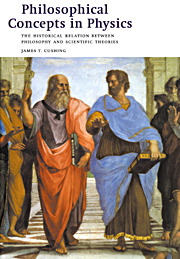 Philosophical Concepts in Physics
Philosophical Concepts in Physics Published online by Cambridge University Press: 05 June 2012
Since we hope to learn something about science and its operation and since science concerns itself with a certain type of knowledge and its attainment, let us begin with a brief consideration of how we arrive at knowledge. A common type of knowledge is that based on opinion or on the acceptance of another's authority. Most of our everyday knowledge used for dealing with the practicalities and necessities of life is gained in either of these fashions. Much of what one learns in the course of reading a book is taken as true simply because it has been presented on the printed page, although hopefully you will be more critical than that. Thus, we can merely have an opinion about a proposition and then decide to accept it as true or we can appeal to the authority of another, as ‘Einstein says’ or ‘Aristotle says,’ or to the authority of a text, as ‘The Bible says,’ or we can assert a fact to be ‘obvious’. Consider the following example:
We hold these truths to be self-evident, that all men are created equal; that they are endowed by their Creator with certain unalienable rights; that among these are life, liberty, and the pursuit of happiness. That, to secure these rights, governments are instituted among men, deriving their just powers from the consent of the governed; that, whenever any form of government becomes destructive of these ends, it is the right of the people to alter or to abolish it, and to institute a new government, laying its foundation on such principles, and organizing its powers in such form, as to them shall seem most likely to effect their safety and happiness.
To save this book to your Kindle, first ensure no-reply@cambridge.org is added to your Approved Personal Document E-mail List under your Personal Document Settings on the Manage Your Content and Devices page of your Amazon account. Then enter the ‘name’ part of your Kindle email address below. Find out more about saving to your Kindle.
Note you can select to save to either the @free.kindle.com or @kindle.com variations. ‘@free.kindle.com’ emails are free but can only be saved to your device when it is connected to wi-fi. ‘@kindle.com’ emails can be delivered even when you are not connected to wi-fi, but note that service fees apply.
Find out more about the Kindle Personal Document Service.
To save content items to your account, please confirm that you agree to abide by our usage policies. If this is the first time you use this feature, you will be asked to authorise Cambridge Core to connect with your account. Find out more about saving content to Dropbox.
To save content items to your account, please confirm that you agree to abide by our usage policies. If this is the first time you use this feature, you will be asked to authorise Cambridge Core to connect with your account. Find out more about saving content to Google Drive.